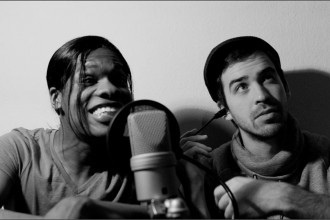Fulfilling a dream often comes at a high price. Manic thoughts and an obsession to perfection, to obtain a dream, overwhelms the senses to what you may truly desire. Martin Bengtsson wrote an autobiography about his experience as a young professional football player, suffering from a psychical craze to succeed. But writing turned out to be his therapy, and he finally managed to get back his own story that was missing from him. Martin spoke to Sensa Nostra about his dramatic experience.
I first started playing football when I was six years old, but it wasn’t until I was around eight or nine that I realised you could make a living out of it, and, immediately, that became my goal. Watching Sweden, against all odds, capture the bronze medal in the 1994 World Cup, I realised it’s possible for even Swedes–not known for footballing–to play in those tournaments. From there my obsession began.
I started to calculate my life around the game. I studied a documentary about the football academy in Ajax, Amsterdam. Watching how hard the students trained, I decided to train exactly as they did. When I read an article about Brazilian star Ronaldo’s workout regiment, during which he trained six hours per day, it all became simple to me: If I wanted to become as good as him, I needed to change my life. Overnight, I did.
I designed a schedule for how I would train six hours each day. I calculated the time I had before school, the time to juggle my ball to school, how much time I had during breaks, all of this added on top of my regular training sessions with my team. On top of this, I began doing sit-ups, push-ups, and skipping rope every night. I squared in my normal life after my workout schedule.
Of course, quickly, my team noticed a differences, and my coaches often used me as an example of exemplary training on the team. But, during this period, my body suffered, and I teetered on anorexia. My manic thoughts eliminated much of the fun I had from playing, and they made me more single-minded. I had defined such a clear plan of how my life would proceed. At fourteen, I was supposed to play in the highest professional league in Sweden. By sixteen, I would get signed by AC Milan, one of the most venerable clubs in Italy–and my favorite.
My plans got delayed slightly. When I was fifteen I got signed by Örebro in the professional Swedish league, and finally at sixteen I made my debut in the highest league in Sweden. But I never really felt at home in Örebro. There was a lot of stress to combine all of the school work and that hard training.
I think that a lot of other kids in my school thought it was fun that you could now see me on the television and some maybe also got a bit jealous, but I never saw myself like anything special because, in my world, I was never a star, I was just one small step closer.
After becoming captain of the Swedish national youth team in 2004, I got contacted by FC Internazionale, the biggest rival of my old favourite team AC Milan. They offered me a contract to play in their primavera-team and I immediately switched from wearing a red and black stripped shirt of AC Milan to a blue and black one Internazionale. Being a supporter is just a pretended game anyway.
Again, I still didn’t feel like a star, just another step closer.
My first month in Italy was perfect. I really enjoyed it, played a lot, made good results on the field, and also befriended a few teammates. The only thing I didn’t like was sharing a room.
At the end of the first season, I got injured for the first time. I hurt my meniscal and had to rest for four-months, during which time I missed some important games. The worst thing was that I was now cut out of the football, and the only thing I could do was just to wait it out, alone in my room.
At that time I started to ask, like most teenagers do, a lot of questions about myself, which I never really had the time to do previously. Questions like: “Who am I?”, “Where am I?”, “What do I really want?”
Here I was in Italy, living a dream of mine, and all that I could ask myself was what the next goal would be. I worked so hard to become a professional player. I realized at that point that I was always evaluating my performance, and now, when I couldn’t perform, I felt worthless. So I bought a guitar I started to write songs and poems, only as a way to express myself and not as a football player. When I eventually healed, I returned home for a national game with the Swedish youth team, and, upon coming back to the Inter house, all of my self-written poems and texts were gone. This sent a clear message: Internazionale does not want these characteristics in a professional player. Being banned from my writing, my creative expression, was devastating. The writing was a way for me to express my inner feelings and frustrations, I couldn’t underand why I wasn’t allowed to embrace my passions, even though I performed well on the field.
I became depressed, and my depression was born out of my unwillingness to establish myself in this millennia-reproduced image of the man. In this case: The football-playing bloke. I had a longing for a more queer and androgynous relationship with myself and my world, something I felt that my football identity couldn’t host. Life lost it’s meaning. For years, I had built up this identity as a football player, and, at the beginning, it seemed I was living the dream. But when I questioned my dream, I also questioned myself; therefore, I thought I couldn’t end my dream without ending myself, so I cut my artery in attempt to kill myself.
I survived, but now, I know what I should have done. I should have discontinued my life as a footballer. At the time, I didn’t know how to say that. But now I do. And I did quit football.
Today I work as a musician and am currently studying to be a dramatist in Malmö, Sweden. In my cultural work I’m seldom manic, something I perfer but also miss. The less mania, the less I can produce. On the other hand though, I sleep more and feel better both psychical and physical. In a world where you are defined based on performance and results, my posture “to try to feel good” is also a resistance or protest against the capitalist agenda. Therefore my grief is marginal.







